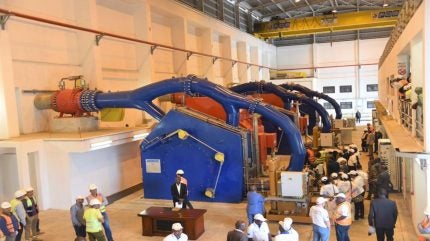
The Republic of Burundi has inaugurated the Jiji hydroelectric power plant in the country’s Bururi province.
Jiji is the first of two hydroelectric plants being developed in the region, with the second, Mulembwe, set to become operational in the next few months.

Discover B2B Marketing That Performs
Combine business intelligence and editorial excellence to reach engaged professionals across 36 leading media platforms.
The two plants will have a combined capacity of 49.5MW, with an estimated annual production capacity of 235 gigawatt hours (GWh).
The projects are being developed at an estimated cost of $320m, provided by the African Development Bank (AfDB), the European Investment Bank (EIB), the World Bank (WB) and the European Union (EU).
EIB regional hub head for East Africa Edward Claessen stated: “The fact that the Jiji and Mulembwe dam project is a renewable energy project, reducing dependence on imported fossil fuels, is particularly significant.
“Our financing for this project formed part of the European Union’s strategy to develop clean, sustainable infrastructure in Africa and is also aligned with decarbonisation efforts needed by companies to grow.”

US Tariffs are shifting - will you react or anticipate?
Don’t let policy changes catch you off guard. Stay proactive with real-time data and expert analysis.
By GlobalDataThe two hydroelectric plants will supply electricity to 15,000 homes, 7,000 companies and 1,700 manufacturing facilities across Burundi.
By improving electrical supply reliability, these projects will strengthen productivity across the health, education, agribusiness and ICT sectors.
World Bank representative in Burundi Hawa Cisse Wagué stated: “The Jiji hydroelectric power plant and the lines and substations built as part of the project are not infrastructure like any other.
“This infrastructure helps ensure Burundi’s economic and social development. It is a key driver to improve people’s access to energy as well as supporting industrialisation, job creation and economic growth.”
The projects have also generated several hundred jobs, enhanced the local economy and bolstered the technical capabilities of nearby communities.
The dependable, accessible and affordable energy offered by the plants will contribute to the country’s economic development.
AfDB country manager in Burundi Pascal Yembiline stated: “As a longstanding partner of Burundi, the AfDB is proud to have contributed to the implementation of this infrastructure project, which is fully in line with its strategic priorities, the Hi-5s.
“We are convinced that this flagship infrastructure will increase access to reliable and affordable energy and help create a sustainably prosperous Burundi.”
In early June 2025, AfDB approved a $184.1m financing package to support the development of the Obelisk solar photovoltaic project in Egypt’s Qena Governorate.





